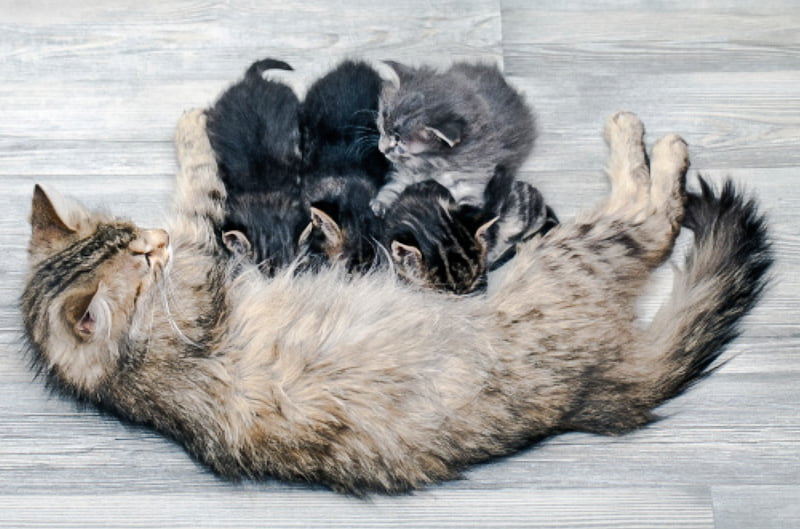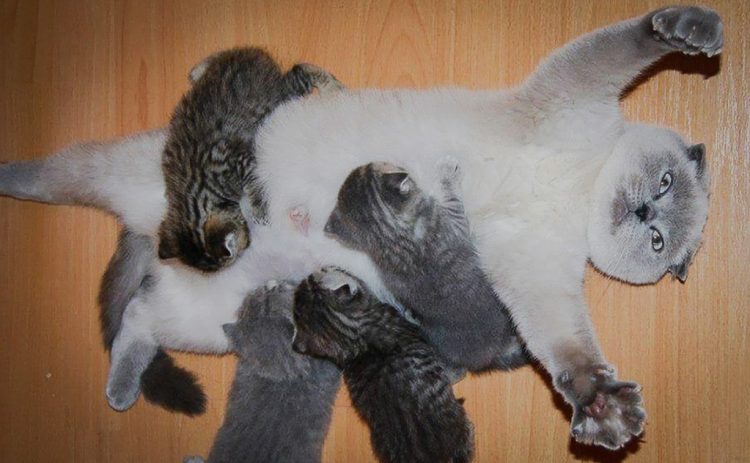A lot of websites say that cats are lactose intolerant meaning that they can’t drink the milk that humans drink (some humans are lactose intolerent too, by the way). The reason is because they don’t have the enzyme lactase in order to digest lactose in milk sugar. When a cat is lactose intolerant it can cause diarrhoea and the production of gas. This is because undigested lactose travels to the large intestine where it is fermented by bacteria.

However, the story is not as straightforward as that in my opinion. This is because obviously kittens drink their mother’s milk. Why, then, are they unable to drink cow’s milk, the kind of milk that people drink? The answer, as far as I can see, is provided by Linda P Case, MS, Adjunct Assistant Professor at the University of Illinois College of Veterinary Medicine and the author of The Cat: Its Behaviour, Nutrition and Health. I have the book.
On Page 340, she states that kittens are not lactose intolerant. She says that milk or milk products can cause digestive upsets and diarrhoea in ADULT cats (I have added the captilization). She further writes that, “This occurs because the lactose that is present in milk requires the intestinal enzyme lactase for digestion. As in most mammals, the cat’s intestinal mucosa has decreased lactase activity as the cat reaches maturity. This change results in lactose maldigestion.”
In other words she’s stating that as kittens grow up and become sub-adults and adults they stop producing lactase, the enzyme which digests lactose in milk sugar. So this is all about the age of the cat. Therefore, the commentaries and articles about cats being lactose intolerant relates to sub-adult cats and older which is not always made clear. It does not, according to Linda Case apply to kittens who are drinking their mother’s colostrum which does contain lactose and which is digested by the kitten.


The question is badly written and inaccurate. Muddling the words cats and kittens is not helpful, nor is muddling colostrum with milk. Who wrote this silly question? The 3rd word should be kittens not cats. Cats do not drink from their mothers, kittens do. Colostrum is the very first milk which contains antibodies vital for the kittens to fight off disease until their own immune system becomes active. The rest of the milk does not contain antibodies. Therefore using the term colostrum instead of milk is another mistake and is misleading when the question is about lactase deficiency which has nothing to do with antibodies. Using the word cats instead of kittens makes the whole question ridiculous. Kittens CAN tolerate cow’s milk because they produce the enzyme lactase, but gradually lose that ability after a few months. Kittens over 4 months should preferably not be given milk. Adult cats should never be given milk because they no longer produce lactase, and will get diarrhea.
Well, Harvey, kittens are cats. Cats is an umbrella word for cats of all ages. I guess that is obvious. The third word has to be ‘cats’ because the question explores the differences in the same animal i.e. cats, at different ages. It is a way of emphasising this apparent oddity.
I have read the article again and I am happy with it. It works for me. Sorry it doesn’t for you.